

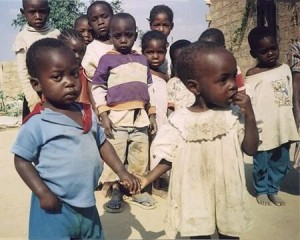 After one day in the slum in Kenya, I noticed something different. It has to do with AIDS. When I first came to Africa, I couldn’t comprehend the enormous devastation that comes from a such an overwhelming impact on an entire society by one disease. But things are changing now. There is a little more hope. Through good edcucation, we are seeing the new cases of HIV drop. Because of the huge numbers of people who are being tested now, there is an awareness of whether you are positive and what appropriate actions should be made because of your status.
After one day in the slum in Kenya, I noticed something different. It has to do with AIDS. When I first came to Africa, I couldn’t comprehend the enormous devastation that comes from a such an overwhelming impact on an entire society by one disease. But things are changing now. There is a little more hope. Through good edcucation, we are seeing the new cases of HIV drop. Because of the huge numbers of people who are being tested now, there is an awareness of whether you are positive and what appropriate actions should be made because of your status.
But perhaps the biggest change has to do with ARVs (antiretroviral drugs). There is no cure for AIDS but antiretroviral drugs if taken properly can prevent HIV from becoming AIDS. When I first started hearing about this new medicine, I never dreamed that it would become accessible and affordable. But it is becoming that way now. Sure, there is a long way to go—but we are on the right path.
Continue reading →
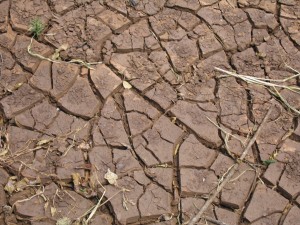 A child dies of hunger every five seconds. It is a statistic. It is why Christian Relief Fund is here. But those children exist somewhere. And they have names. I was always concerned about them but never took it personally until I started knowing their names and where they live. What I have discovered is that those statistics are the representations of real people with real names.
A child dies of hunger every five seconds. It is a statistic. It is why Christian Relief Fund is here. But those children exist somewhere. And they have names. I was always concerned about them but never took it personally until I started knowing their names and where they live. What I have discovered is that those statistics are the representations of real people with real names.
Children die daily in Barwessa, Kenya. There is hardly any food, and if you did find some—the price of it has tripled in the last year. There is no water. Oh, you can find some—but it is polluted and you would have to walk fifteen to twenty miles to get it. And when you finally spend the day carrying a small container of water, what you really have is water that may kill you because of the parasites. But if you don’t drink it, you will die. But if you drink it, you will die.
My first day at work, I was trying to get a sponsor for a little girl named “Maurine.” But she starved to death before I could help her. Her name is never really far from me anymore. It’s not that a child dies of hunger every five seconds. It’s that Maurine died.
Christian Relief Fund began when Baxter Loe, our founder, didn’t get support to John Abraham of India in time. He starved to death. His name was “John Abraham.”
Continue reading →
 Certainly, this blog is about issues of social compassion. But it is not every day that your son gets married. I am pretty excited about the marriage of Jeremy Jones and Emily Mrazek. The wedding took place on Richmond Beach in Seattle. It was a pretty risky move since it rains so much in Seattle in June. But it was sunny and in the 70s. And to make matters cooler, two F-14s did a fly over right when the ceremony began. Barbie said we should call the Navy and thank them, but I was afraid they might try to charge us.
Certainly, this blog is about issues of social compassion. But it is not every day that your son gets married. I am pretty excited about the marriage of Jeremy Jones and Emily Mrazek. The wedding took place on Richmond Beach in Seattle. It was a pretty risky move since it rains so much in Seattle in June. But it was sunny and in the 70s. And to make matters cooler, two F-14s did a fly over right when the ceremony began. Barbie said we should call the Navy and thank them, but I was afraid they might try to charge us.
I have never seen a prettier wedding (I know I am prejudiced—but it was pretty spectacular). The bride was absolutely stunning (she should be on the cover of a magazine). The groom looked pretty good too. And what a joy it was to see all of our old friends there! Months ago I was curious who would be asked to perform the wedding. I wasn’t sure since Emily’s dad and I are both ministers. But they made the perfect choice and asked my oldest son, Patrick, to perform the ceremony.
It was funny (it had to be if you know Pat) but also very moving. It had one unique teaching that was very thought provoking and might be helpful for all our marriages and relationships. It might even be helpful for global matters like we discuss in this blog.
Continue reading →
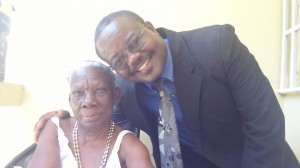 I’m always trying to counsel people to stay out of debt. Debt seems to be one of the biggest sources of frustration and depression for families that I know. My usual rule of thumb is to stay out of debt for anything unless it appreciates in value. And these days, who knows what will appreciate? But now I am to rethinking this advice—well at least in one particular place.
I’m always trying to counsel people to stay out of debt. Debt seems to be one of the biggest sources of frustration and depression for families that I know. My usual rule of thumb is to stay out of debt for anything unless it appreciates in value. And these days, who knows what will appreciate? But now I am to rethinking this advice—well at least in one particular place.
As I think back on my recent mission to Haiti, one person tends to overwhelm my memory. His name is Moise (Moses in our language). Moise is our Christian Relief Fund representative in Cap-Hatien. Two words captivate his spirit. No matter what you say to Moise, he tends to answer you with—“Thank You!” Indeed Moise is a person with an attitude of gratitude. Even though he lives in a poverty stricken place with the aftereffects of earthquakes and cholera, you would be hard pressed to find a happier man.
It is not only his attitude that is impressive, but his schedule is also unbelievable. Moise runs our CRF school which has hundreds of children. He also is the preacher at our church on that location where he preaches three times a week. Moise also runs our two orphanages and a home for the elderly. He also teaches music one hour a week to all the children and leads a marching band. He drives a big truck around the city to transport children (kind of like a school bus driver). At 5:30 in the morning, he mentors younger men to be ministers like him in a preaching training school. His community hospital doesn’t feed the patients, so Moise brings food in for the infirmed. And he even does welding and construction on the side to help with income. How does he do all of this? I’m not sure. Why does he do all of this? I think I got it when I was planning a Vacation Bible School for children with him. We were buying food for about 300 children, but he wanted to buy food and invite 200 more. I said that we didn’t have the room or money. He said, “But it is 200 more people who need to hear about Jesus. How can we leave them out?”
Continue reading →
Posted in Haiti2011
|
Tagged Haiti2011
|
A little girl dressed in a pink dress was walking down the street with something in her hand. It was my last sight as I left the School of the Sovereign in Haiti. I could only smile. It is exactly what my heart wanted to see. She had heard the news. She was now traveling in a different direction.
We had done many diverse and helpful things in our time in Haiti. We found around 150 new children to sponsor through CRF who were orphaned or destitute. We helped teach around 250 children at our school. We painted the classrooms. We made pews for the church. We visited the widows. But there was one thing that pretty much dominated our thinking on this trip—water.
We had built water purification systems in the area that had been exposed to so much cholera. And now clean water was flowing to all the children at our school. But it didn’t seem to be enough. Hundreds of thousands of people were expected to die in this region from the water this year.
Continue reading →
Posted in Haiti2011
|
Tagged Haiti2011
|
I spend most of my time trying to practice James 1:27. But it seems like I’m always on the second part of it—“orphans.” Clearly the verse is about others too. True religion is also about helping “widows.” Most of my Haiti trip has been about helping orphans with water, food, education, housing, and spiritual training. But today it changed directions.
We went to an “old folks home.” That’s what they call them here. It is probably not politically correct where I come from, but that is not much of an issue here. I’m very familiar with them since we recently had to put my mom in an “assisted living center.” But this was Haiti. I knew it would have the same problems as in America. And I knew that the problems of taking care of the elderly in poverty would intensify the tough issues immensely.
When we walked into the home that Christian Relief Fund helps with, I felt a touch. Nicole, a fellow mission trip volunteer from Ole Miss, had just put her hand on my arm. She said, “I just need to touch you.” I knew exactly what she meant. She just needed a reality touch. She just needed to know that someone else was there. It was simply to know that you were going to be okay in this new experience. Touching can be scary as we were to find out. But the lack of touch can even be scarier at times.
Continue reading →
Posted in Haiti2011
|
Tagged Haiti2011
|
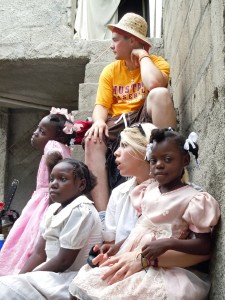
These little girls were waiting for a chance to taste the clean water.
The cup was shaped just like a communion cup. But it was a little bigger. A prayer of blessing was invoked before we shared it. We stood in a circle as we passed it around. It was a holy moment for us, but it wasn’t the Lord’s Supper. Nearly everyone had a taste from the cup. One person was left out or saved to last as we drank. He was a different. Certainly, he was a different race and color. He was from a different economic background. But that is not what made him different in this circle. The difference was that he was a man from Haiti. He should not have to go first in this taste test.
No, we weren’t drinking the proverbial Kool-Aid. But it was pretty dangerous still. We had just spent the last few days installing a water purification system for an area of Haiti that is going through one of the worst cholera epidemics in a long time. We had just finished purifying our first 300 gallons of water. But was it really pure? Could you still get cholera like you could in other water here? How would you know? There’s only one way to know. You have to taste it.
But whom would you pick to taste it? Certainly, you could just say that we did a good deed and leave them with the new water. It had to be as good as the old water. Let the people of Haiti drink it and go on as things were before. They had already been exposed to bad water, so why not let them continue to be?
Continue reading →
Posted in Haiti2011
|
Tagged Haiti2011
|
A new study says that there will be 779,000 deaths due to cholera in Haiti this year. Doesn’t that break your heart? Last week an examination revealed that the U.N. dumping waste caused much of the cholera. Doesn’t that mess up your mind? Helping shouldn’t hurt.
I’m in Haiti now with a team of students installing water purification systems. It won’t solve the problem, but there will be a lot more people able to get some clean water. I especially have been concerned about all the children we sponsor at CRF. They have been drinking very contaminated water.
Here’s how I define a rich kid these days. If a child has clean water that won’t kill him, he is a rich kid by the standards of the world today.
I know we can’t save everyone or get clean water to everyone. I know we can’t stop the cholera epidemic, but we can do something.
My major professor in seminary told me of his first trip to Calcutta to deliver a few thousand pounds of grain. He was overwhelmed with the poverty as he literally had to step over dead bodies on the street. He felt so small and his help so insignificant. In his discouragement, his mentor told him—“People are born one at a time, people live one at a time, and people die one at a time. You have to start somewhere with someone.”
Posted in Haiti2011
|
Tagged Haiti2011
|
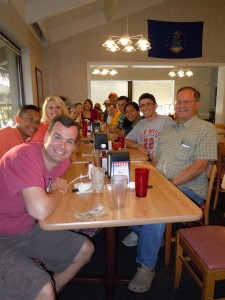 Do you ever feel like God just added a new verse to the Bible? Do you know what I mean? You know it has been there, but you just haven’t noticed it or simply forgotten it. Let me share one of those with you. I was taking some quiet time reading my Bible with a bunch of students from a campus ministry in Auburn when I discovered it. Wow, it just opened up my head and heart.
Do you ever feel like God just added a new verse to the Bible? Do you know what I mean? You know it has been there, but you just haven’t noticed it or simply forgotten it. Let me share one of those with you. I was taking some quiet time reading my Bible with a bunch of students from a campus ministry in Auburn when I discovered it. Wow, it just opened up my head and heart.
If I were to ask most of you what you really want in life, you might answer, “I’d like things to go well for me.” Certainly that is better than the alternative. We all want things to turn out well for us in our lives. But how does that happen? How can we be certain it will happen? And if you added something else to your desire for your life, wouldn’t you say—“ I would like to know God.” Isn’t that the most important thing in the universe? So how can I make sure that I actually discover or recognize the Supreme Being?
Here’s the verse that created such an “Aha!” for me. It’s Jeremiah 22:16. I didn’t recall it, but now it is absolutely transforming my life. “He defended the cause of the poor and needy, and so all went well. ‘Is that not what it means to know me?’ declares the Lord.”
In other words, if you want things to well for you and if you want to know God—then you should defend the cause of the poor and needy. Jeremiah 22:16 is the theme verse for our mission team as we go to Haiti. We are memorizing it. Maybe you want to show some solidarity with us and memorize it too.
Continue reading →
Posted in Haiti2011
|
Tagged Haiti2011
|
 It seems like nearly everyone wants to consider himself a part of the middle class. That certainly is where I usually identify myself. Although the middle class might involve aspects like education and values, we most often think of it as the income we generate. If we make it to the middle class, we tend to consider our economic resources to be high enough to not only survive but also to obtain a lot of products to enjoy that are beyond the necessities.
It seems like nearly everyone wants to consider himself a part of the middle class. That certainly is where I usually identify myself. Although the middle class might involve aspects like education and values, we most often think of it as the income we generate. If we make it to the middle class, we tend to consider our economic resources to be high enough to not only survive but also to obtain a lot of products to enjoy that are beyond the necessities.
With that in mind, I was so glad to see a report last week that said that 1/3 of Africans have entered the middle class. I rejoiced that things were really improving on that continent. My happiness dwindled a little bit when I discovered what middle class meant. I should have known.
The United Nations defined some years ago the standard of poverty as making $1 a day. If you make less than a dollar a day, then you are living in poverty. So then where does the middle class start if poverty is at one dollar? Middle class started on the African continent at $2 a day. I was hoping and anticipating a little more. Yes, if you make $2 a day, you are considered to be in the middle class. Now the middle class goes up to $20 a day, but most Africans are on the bubble of poverty bordering between $1 and $2 a day.
As I examined Sub-Sahara Africa, I learned that 58% of the people were below the poverty level. That means that nearly two-thirds of the people there make less than a dollar a day.
Continue reading →


 After one day in the slum in Kenya, I noticed something different. It has to do with AIDS. When I first came to Africa, I couldn’t comprehend the enormous devastation that comes from a such an overwhelming impact on an entire society by one disease. But things are changing now. There is a little more hope. Through good edcucation, we are seeing the new cases of HIV drop. Because of the huge numbers of people who are being tested now, there is an awareness of whether you are positive and what appropriate actions should be made because of your status.
After one day in the slum in Kenya, I noticed something different. It has to do with AIDS. When I first came to Africa, I couldn’t comprehend the enormous devastation that comes from a such an overwhelming impact on an entire society by one disease. But things are changing now. There is a little more hope. Through good edcucation, we are seeing the new cases of HIV drop. Because of the huge numbers of people who are being tested now, there is an awareness of whether you are positive and what appropriate actions should be made because of your status.






